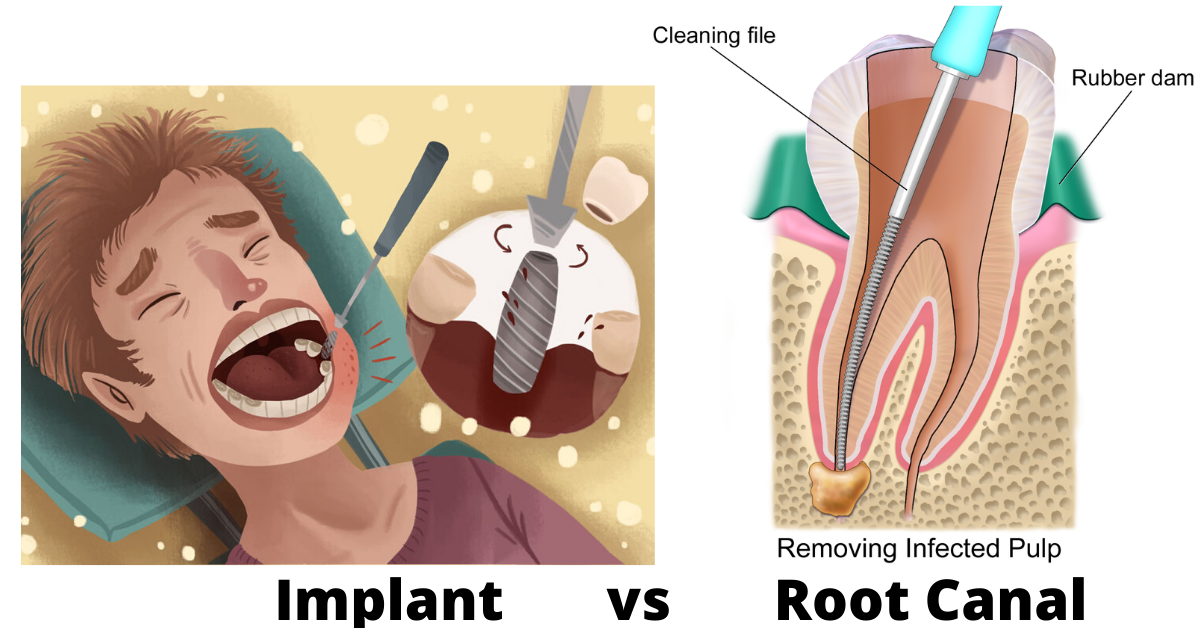Implant Vs Root Canal: Best Option Guide

When faced with tooth loss or severe tooth decay, two common dental procedures often come into consideration: dental implants and root canals. Both options have their own set of benefits and drawbacks, and the best choice for a patient depends on various factors, including the condition of the tooth, the patient’s overall health, and their personal preferences. In this comprehensive guide, we will delve into the world of dental implants and root canals, exploring their differences, advantages, and disadvantages, to help you make an informed decision.
Understanding Dental Implants
Dental implants are artificial tooth roots made of titanium that are surgically placed into the jawbone to support a crown or bridge. This procedure is ideal for patients who have lost a tooth due to injury, decay, or gum disease. The implant fuses with the jawbone over time, providing a stable base for the artificial tooth. Dental implants are known for their durability and natural appearance, making them a popular choice among patients seeking a long-term solution.
Advantages of Dental Implants:
- Natural Appearance and Feel: Implants are designed to mimic the look and feel of natural teeth, allowing patients to regain their confidence in their smile.
- Durability: With proper care, dental implants can last for many years, often a lifetime.
- Improved Oral Function: Implants enable patients to chew and speak with ease, restoring their oral function.
- Low Maintenance: Unlike dentures, implants do not require special cleaning or adhesives.
Understanding Root Canals
A root canal is a procedure used to save a tooth that is severely decayed or infected. During the treatment, the dentist removes the infected pulp and nerve from the tooth, cleans and shapes the canal, and then fills it with a special material. The tooth is then sealed and often capped with a crown to protect it from further decay. Root canals are a viable option for patients who wish to preserve their natural tooth.
Advantages of Root Canals:
- Tooth Preservation: The primary goal of a root canal is to save the natural tooth, which is always the preferred option when possible.
- Pain Relief: Root canals can provide immediate relief from toothache pain caused by infection.
- Cost-Effective: Generally, root canals are less expensive than dental implants, especially for a single tooth.
- Quick Recovery: Most patients can return to their normal activities shortly after the procedure.
Implant Vs Root Canal: Key Considerations
When deciding between a dental implant and a root canal, several factors come into play. These include the condition of the tooth, the extent of the decay or infection, the patient’s budget, and their personal preference regarding the appearance and feel of the tooth.
- Condition of the Tooth: If the tooth is severely damaged, a dental implant might be the better option. For teeth that can still be saved, a root canal is often preferred.
- Budget: Dental implants are generally more expensive than root canals. However, their longevity and low maintenance requirements can make them a cost-effective option in the long run.
- Personal Preference: Some patients prefer the natural look and feel of implants, while others prioritize preserving their natural tooth through a root canal.
Making the Right Decision
Ultimately, the choice between a dental implant and a root canal should be made in consultation with a dental professional. They can assess the condition of your tooth and provide personalized recommendations based on your specific needs and circumstances. It’s essential to weigh the pros and cons of each option, considering your health, budget, and personal preferences.
Conclusion
Both dental implants and root canals are valuable procedures in the field of dentistry, each serving a unique purpose. By understanding the benefits and drawbacks of each option and consulting with a professional, you can make an informed decision that meets your dental needs and enhances your overall well-being. Whether you choose a dental implant for its durability and natural appearance or a root canal for its ability to preserve your natural tooth, the goal remains the same: to achieve a healthy, confident smile that lasts a lifetime.
FAQ Section
What is the success rate of dental implants?
+Dental implants have a high success rate, with studies showing that about 95% of implants are successful. Success depends on factors such as the health of the patient, the density of the jawbone, and the expertise of the dentist.
Are root canals painful?
+Thanks to modern anesthesia and dental techniques, root canals are generally not painful. Patients might experience some discomfort or sensitivity after the procedure, but this can usually be managed with over-the-counter pain relievers.
How long does a root canal take to heal?
+The healing time after a root canal can vary, but most patients can return to their normal activities the next day. The tooth may feel sensitive for a few days, and it’s recommended to avoid chewing on the treated tooth until it’s fully restored with a crown.
Can anyone get a dental implant?
+Most adults can be candidates for dental implants, but certain health conditions, such as uncontrolled diabetes or significant bone loss, might affect eligibility. A thorough evaluation by a dental professional is necessary to determine if implants are a suitable option.
How do I care for my dental implant or root canal treated tooth?
+Both dental implants and root canal treated teeth require regular dental care, including brushing, flossing, and regular check-ups. For implants, it’s also important to avoid smoking and to follow any specific aftercare instructions provided by your dentist.


